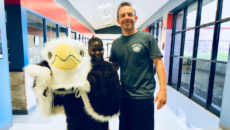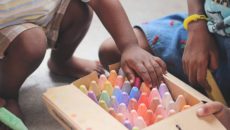When your child enters preschool, he’s exposed to new and wonderful experiences. He gains new skills, plays new games, and interacts with new groups of kids. He also begins to learn about the world beyond his own.
Family Questions
Preschoolers begin to understand that families exist in all shapes and sizes, and are formed in different ways. They may learn that Peter has two brothers, Carmen lives with her grandmother, and Tia’s mommy has a baby in her tummy. As they try to make sense of such information, they ask lots of questions: “How come I don’t have a brother? What happened to Carmen’s mother? Did I grow in your tummy, too?”
In many cases, these questions (and others that come up in class) will cause your child to probe more deeply into her own past. If a teacher asks each student to tell the class where she was born, your child may ask you, “How come I was born in China?” If a classmate’s mother is pregnant, your child may ask, “How come I didn’t grow in your tummy?” Even if you’ve told your child her adoption story a hundred times, she’ll want to hear it again. She’ll have new questions, and will process old information in more complex ways. How can you help?
Stay calm. Preschoolers need to make sense of the world, to figure out how people are the same—and different. So they ask lots of questions. This is normal!
Keep it simple. Fortunately, a preschooler’s questions don’t require long, complicated answers. If your child asks, “Didn’t my birth mother love me?” you can simply say, “Yes, she loved you very much.” (See “What to Say,” below, for a sample dialogue.) If your child wants more details, he’ll ask.
Be honest. When sharing your child’s story, tell the truth, using age-appropriate words. You might say, Your birth mother wasn’t ready to be a mommy yet, but she wanted you to have a wonderful family. There’s no need to share any difficult details at this point, but don’t say anything you’ll have to contradict later.
Correct false information. Preschoolers have wild imaginations, and they often embellish their stories. If your child says, “My Russian mommy was a princess,” correct her—but be prepared to answer questions about her birth mother.
Point out similarities. Young kids need to understand how they are connected to their families, and how much you all share. If your child asks, “How come I have black hair and you have yellow hair?” acknowledge that difference, then discuss how you’re the same. Say, “You’re right, our hair is different. But we have the same laugh.”
Listen up. Children sometimes work out their feelings about adoption through play. While playing house with a friend, for example, your child might pretend that she had a mommy who died. Watch—and listen to—what comes up during these interactions.
Nurture your child. Have fun with the questions your preschooler presents to you, and explore them with enthusiasm. Allow your child to feel trusted and safe, and let her know that she can ask you anything—at any time.


